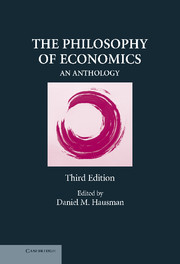Book contents
- Frontmatter
- Contents
- Introduction
- PART ONE CLASSIC DISCUSSIONS
- PART TWO POSITIVIST AND POPPERIAN VIEWS
- PART THREE IDEOLOGY AND NORMATIVE ECONOMICS
- PART FOUR BRANCHES AND SCHOOLS OF ECONOMICS AND THEIR METHODOLOGICAL PROBLEMS
- PART FIVE NEW DIRECTIONS IN ECONOMIC METHODOLOGY
- 22 The Rhetoric of This Economics
- 23 Realism
- 24 What Has Realism Got to Do with It?
- 25 Feminism and Economics
- 26 Credible Worlds: The Status of Theoretical Models in Economics
- Selected Bibliography of Books on Economic Methodology
- Index
- References
24 - What Has Realism Got to Do with It?
Published online by Cambridge University Press: 05 June 2012
- Frontmatter
- Contents
- Introduction
- PART ONE CLASSIC DISCUSSIONS
- PART TWO POSITIVIST AND POPPERIAN VIEWS
- PART THREE IDEOLOGY AND NORMATIVE ECONOMICS
- PART FOUR BRANCHES AND SCHOOLS OF ECONOMICS AND THEIR METHODOLOGICAL PROBLEMS
- PART FIVE NEW DIRECTIONS IN ECONOMIC METHODOLOGY
- 22 The Rhetoric of This Economics
- 23 Realism
- 24 What Has Realism Got to Do with It?
- 25 Feminism and Economics
- 26 Credible Worlds: The Status of Theoretical Models in Economics
- Selected Bibliography of Books on Economic Methodology
- Index
- References
Summary
Tony Lawson (1950–) received a Ph.D. in Economics from Cambridge University after a first degree in mathematics from the University of London. Lawson is the organizer of the long-running Cambridge Realist Workshop and the Cambridge Social Ontology Group, and he is currently executive director of the Cambridge Centre for Gender Studies. His work lies on the boundaries between philosophy and economics, with a special emphasis on ontology. He has been an editor of the Cambridge Journal of Economics for twenty-five years, and sits on many other editorial boards including that of Feminist Economics. The author of numerous papers and books, Lawson has played a key role in promoting heterodox economics and establishing social ontology as a focus of research in modern economics.
For several years now I and a number of others (see e.g., Fleetwood, 1999) have been contributing to a project in economics that is often referred to as realist. In a recent article in Economics and Philosophy Dan Hausman questions whether realism is actually a feature of this project worth emphasizing (Hausman, 1998). In fact, Hausman goes as far as to suggest that making reference to this aspect of the project may actually be misleading or otherwise unhelpful. His basic worry is summarized in the concluding section of his paper where he writes:
To label one's program for economic methodology as ‘realist’ inevitably suggests that the competing programs are not realist or fail to be realist enough. In the case of economic methodology, this suggestion is misleading, because there is no anti-realist school of economic methodology, and there are few methodologists (as opposed to economists) who are instrumentalists either. […]
- Type
- Chapter
- Information
- The Philosophy of EconomicsAn Anthology, pp. 439 - 453Publisher: Cambridge University PressPrint publication year: 2007
References
- 3
- Cited by



